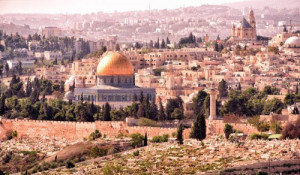
Today on One Land Many Voices, we focus on the issue of Jerusalem. In the first half of the show, we hear from a local Portlander who grew up in Jerusalem. In the second part of the show, we play an excerpt of the Michael Slate show, in which he interviews Professor Richard Falk from Princeton University about the history and politics of Jerusalem.
On December 6th, US President Donald Trump made a unilateral declaration that Jerusalem was the capital of Israel , contradicting decades of US policy, flagrantly violating international law and signed peace agreements, and discarding the Palestinian people’s basic rights.
In making that declaration, the U.S. government joined Israel as the only two countries in the world to claim that Jerusalem is the capital of Israel. In 1947, when the United Nations recommended a partition plan for Palestine in order to create a Jewish state on what had been Palestinian land, the city of Jerusalem was recommended to remain an international city in which all would be welcome.
Following the declaration, the Israeli government has moved ahead full force with policies of displacement of Palestinian residents who have lived there hundreds, and, in some cases, thousands of years. The move has enflamed the tensions between the U.S. and the Muslim world, especially as it came a day after the U.S. Supreme Court decided to allow the travel ban to the U.S. that most legal experts say discriminates blatantly against Muslims.
Prior to Trump's announcement, Palestinians living in Jerusalem already lived under martial law by the Israeli military, and faced significant discrimination, underfunding of schools and services, denial of civil law and due process, and loss of land, homes and communities. Palestinians fear that this move by the U.S. administration will embolden the Israeli government and militia movement to expand their program of ethnic cleansing of Palestinians in the city of Jerusalem.
- KBOO


